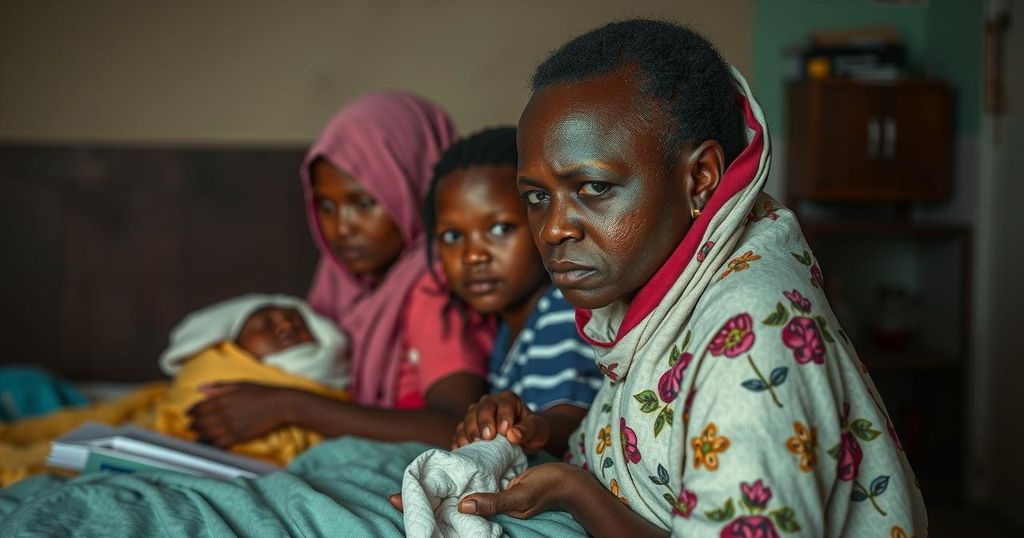Understanding the Outbreak of Disease X in the Democratic Republic of Congo

The Democratic Republic of Congo is facing an outbreak of an undiagnosed illness termed Disease X, affecting 406 people and resulting in 31 fatalities, primarily among children. Experts hypothesize that the disease may stem from known infections like malaria or pneumonia, as investigations by health authorities continue amidst significant logistical challenges due to the region’s remoteness. The Africa CDC is working closely with local entities and the WHO to identify and manage the outbreak, which underscores the critical need for effective health responses in the area.
Currently, an undiagnosed illness termed Disease X is spreading in the Democratic Republic of Congo (DRC), primarily in the Panzi district of Kwango province. Reaching at least 406 reported cases and resulting in 31 deaths, predominantly among malnourished children, medical professionals face significant challenges diagnosing the disease due to inadequate infrastructure and testing capabilities. Experts suggest the disease likely stems from known infections such as acute pneumonia or malaria, with investigations ongoing by both local health authorities and international bodies, including the WHO and the Africa CDC. The remoteness of the affected area complicates matters, hindering timely responses to the outbreak as detailed laboratory testing is limited.
Health experts, including epidemiologists, speculate that the disease could signify a mixture of infections, referencing symptoms resembling flu-like illnesses. Dr. Paul Hunter from the University of East Anglia emphasizes the need for thorough investigations, stating, “Reports of outbreaks with fatalities crop up somewhere in the world several times a year. Almost all turn out to be an already well-known infection with limited global consequences.” The situation reflects a complex challenge, wherein the severity of symptoms such as fever, cough, and anemia parallels those of multiple diseases, requiring a multifaceted diagnostic approach.
The Africa CDC has mobilized teams to collaborate with the WHO and local health ministries in the pursuit of identifying the underlying causes of this unidentified health crisis. As meticulous laboratory tests are underway, including considerations for enhanced measures against possible mosquito-borne transmissions, authorities face logistical hurdles in reaching affected areas. The deputy governor of Kwango province, Remy Saki, has enforced measures to mitigate spread, including monitoring inter-village movements and promoting mask-wearing.
In diagnosing this mysterious illness, a multitude of obstacles remains, primarily due to the limited capacity for testing in existing local healthcare setups. Without specialized detection capabilities in the Panzi district, there is an inevitable delay in discovering the disease’s true nature. Dunning, an infectious disease specialist, provides insight, asserting that timely diagnoses and treatments are imperative.
Given the current circumstances, medical professionals and health authorities urgently need to facilitate investigation processes within the community and healthcare systems to ensure effective containment protocols are enforced.
In summation, while the ongoing outbreak sparks concern, expert analyses indicate that it may ultimately relate to previously identified illnesses, underscoring the necessity for prompt action and international assistance. The collaboration of health experts at all levels remains vital as the investigation continues into finding the precise cause of this alarming yet enigmatically complex health issue in the DRC.
In December 2024, reports emerged regarding a troubling outbreak known as Disease X in the Democratic Republic of Congo. The origins of this illness are unclear, as health professionals are unable to establish whether the infection is viral or bacterial. An estimated 406 cases have been reported, highlighting challenges within the local healthcare infrastructure, particularly in the handling of epidemic threats. The regional scarcity of diagnostic resources complicates swift identification and containment efforts, contributing to international health concerns amidst calls for thorough investigations by the Africa CDC and WHO. The DRC, characterized by vast and often inaccessible terrains, poses significant logistical challenges for health response teams, with barriers such as poor communication networks and protracted travel times to healthcare facilities further exacerbating the situation. Consequently, disease researchers seek to clarify whether the ongoing health crisis is due to a novel infectious agent or a resurgence of previously managed diseases known to circulate in the region, as the prospect of a widespread epidemic looms.
The disease outbreak in the DRC, referred to as Disease X, remains undiagnosed, with an emphasis on the relevance of historical infections leading to similar clinical presentations. Health professionals are urged to conduct swift investigations while collaborating internationally to examine the potential of multiple overlapping diseases causing the outbreak. Efforts to manage the situation necessitate robust support from local and global health agencies to reinforce diagnostic capabilities within communities, thereby facilitating effective responses against further spread. The collective action of health teams will be critical in resolving this mysterious health crisis and protecting vulnerable populations.
Original Source: www.dw.com







